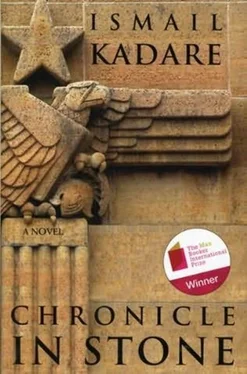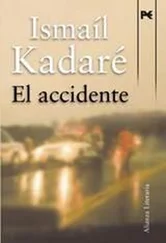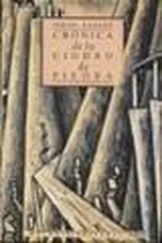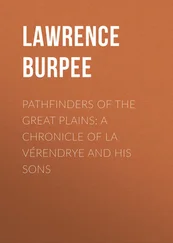Ismaíl Kadaré - Chronicle in Stone
Здесь есть возможность читать онлайн «Ismaíl Kadaré - Chronicle in Stone» весь текст электронной книги совершенно бесплатно (целиком полную версию без сокращений). В некоторых случаях можно слушать аудио, скачать через торрент в формате fb2 и присутствует краткое содержание. Жанр: Современная проза, на английском языке. Описание произведения, (предисловие) а так же отзывы посетителей доступны на портале библиотеки ЛибКат.
- Название:Chronicle in Stone
- Автор:
- Жанр:
- Год:неизвестен
- ISBN:нет данных
- Рейтинг книги:4 / 5. Голосов: 1
-
Избранное:Добавить в избранное
- Отзывы:
-
Ваша оценка:
- 80
- 1
- 2
- 3
- 4
- 5
Chronicle in Stone: краткое содержание, описание и аннотация
Предлагаем к чтению аннотацию, описание, краткое содержание или предисловие (зависит от того, что написал сам автор книги «Chronicle in Stone»). Если вы не нашли необходимую информацию о книге — напишите в комментариях, мы постараемся отыскать её.
Chronicle in Stone — читать онлайн бесплатно полную книгу (весь текст) целиком
Ниже представлен текст книги, разбитый по страницам. Система сохранения места последней прочитанной страницы, позволяет с удобством читать онлайн бесплатно книгу «Chronicle in Stone», без необходимости каждый раз заново искать на чём Вы остановились. Поставьте закладку, и сможете в любой момент перейти на страницу, на которой закончили чтение.
Интервал:
Закладка:
Apart from the fact that the cows no longer grazed in the field across the river, nothing worrisome had happened, except for the sudden disappearance of Kako Pino’s cat.
She was just now at her window talking about it with Bido Sherifi’s wife, who was leaning out of her own window, her hands covered with flour.
“I tell you, he’s the one who took your cat, that cursed teacher won’t leave a single one alive. He’s the one who took it.”
“Of course. Who else? It’s the end of the world.”
Obviously they were talking about Qani Kekezi.
“That’s what education does for you, Kako Pino. More harm than good. I ask you: a cat-thief!”
“Yes, he’s gone completely crazy,” said Kako Pino. “The poor cats are afraid to set foot outside any more. A topsy-turvy world we live in!”
“But that’s not all,” said Bido Sherifi’s wife. “Wait until he starts coming after people with that knife. Have you ever seen eyes like his? Blood-red they are.”
Bido Sherifi’s wife shook her hands, raising a cloud of flour that caught the sun and glowed as if it was on fire.
“The end of the world,” said Kako Pino. “Can’t tell who’s worse than the others.”
The shutters on both windows closed, ending the conversation. I had nothing to do, and sat watching the street. A cat was jumping from roof to roof, then came down and crossed the street. Nazo’s son, Maksut, was coming home from the market. He carried another severed head under his arm. Whose head? I couldn’t stand it, so I looked away.
I tried to picture Margarita, but was surprised to find that I couldn’t recall her face very well. She had come into my thoughts two or three times. Did she realise that I dragged her name with me around the house, banging it on the stone, catching it on nails? Did she feel no pain from all that?
The day before I had talked to Ilir about it.
“At Grandfather’s, there’s now a beautiful married woman,” I told him.
He wasn’t impressed and didn’t answer. A little later I mentioned Margarita to him again. Again he showed no interest, and only asked me, “Does she have pink cheeks?”
“Yes,” I answered, somewhat perplexed. “Pink.”
Actually, I didn’t remember what colour her cheeks were. The moment Ilir asked about her, Margarita’s face suddenly seemed misty. A day passed and the image was even less clear. I was forgetting her.
The third time she came to mind, I mentioned her to Ilir again. He stared at me. This time he’s going to say something, I thought, feeling happy about it already.
“You know what?” Ilir said. “Last night I stole my mother’s garters to make a slingshot. Do me a favour and hold onto them for a few days. I’m afraid she’ll find them.”
I stuffed the garters into my pocket.
There was no one in the street. I remembered that Javer had promised to give me a book. I left and went to his place.
Javer was alone, smoking a cigarette and whistling to himself.
“You promised you would give me a book,” I said.
“ Si, signor ,” he said. “Here are the books. Pick one.”
There was a shelf of books on the wall. I walked over and looked at them. I couldn’t believe my eyes. I had never seen so many books.
“Look,” Javer explained, “this is the name of the author, the one who wrote the book, and this is the title. But I’m afraid none of these books will really interest you.”
I took a bunch of books off the shelves, one by one. Most of the titles were meaningless to me.
“I’ll take this one,” I said. “The author is a man called Jung.”
Javer burst out laughing.
“You want to read Jung?”
“Why not? He writes about magic, doesn’t he?”
Javer laughed again. I was irritated and turned to leave, but he stopped me.
“Look,” he said, “take another one instead. I can barely understand Jung myself. Anyway, he didn’t write in Albanian.”
I looked through the books again and plunged into reading. Javer kept on smoking and humming. Finally I found one that had on its opening page the words “ghost”, “witches”, “first murderer” and even “second murderer”.
“OK, I’ll take this one,” I said, without even looking at the title.
“Really? Macbeth ? It’ll be too hard for you.”
“I want it.”
“Then take it,” said Javer. “But don’t lose it.”
I left almost at a run, went home and pushed the door open. I was amazed to have a book in my hands.
There were all kinds of things in our big house: copper cauldrons, plates of all sizes, bread bins, mortars, iron hooks, beams, steel balls (one was supposed to be a cannonball), barrels, chests with dates painted on them, all sorts of buckets, pitchers, and ewers, a rifle with a butt inlaid with mother-of-pearl, a whole clutter of strange old things including a trough for slaking lime – but not a single book. Apart from a torn and yellowing manual of dream interpretation, there wasn’t a single sheet of printed paper in the house.
I closed the door and scurried upstairs at top speed. There was no one in the living room. I sat by the window, opened the book, and started to read. I read very slowly, and hardly understood anything. I read up to a certain point, then started over again from the beginning. Little by little I began to understand what I was reading. My head was spinning. Outside it was getting dark. The letters started dancing around, trying to jump out of line. My eyes hurt.
After dinner I went to the kerosene lamp and opened the book again. The letters looked frightening in the yellow lamplight.
“That’s enough reading,” my mother decreed. “Go to bed.”
“You sleep, I’m going to read.”
“No,” she said. “We don’t have enough kerosene.”
I couldn’t get to sleep. The book lay nearby. Silent. A thin object on the divan. It was so strange… Between two cardboard covers were noises, doors, howls, horses, people. All side by side, pressed tightly against one another. Decomposed into little black marks. Hair, eyes, legs and hands, voices, nails, beards, knocks on doors, walls, blood, the sound of horseshoes, shouts. All docile, blindly obedient to the little black marks. The letters run in mad haste, now here, now there. The h ’s, r ’s, o ’s, t ’s gallop over the page. They gather together to create a horse or a hailstorm. Then gallop away again. Now they create a dagger, a night, a ghost. Then streets, slamming doors, silence. Running and running. Never stopping. Without end.
I slept so fitfully I thought I had a fever. Through the sleep I could just barely feel a steady laboured breathing coming from outside, a painful shifting of streets and neighbourhoods. The city seemed to be scratching itself in slow motion. It was a pain of transformation. The streets swelled, twisted. The walls of houses grew thick and turned into the battlements of Scottish castles. Fearsome keeps loomed up here and there.
In the morning the city looked worn out from its trials. It had changed. But not that much.
I spent almost all day reading.
Night fell again. I looked outside at the walls and buildings. My mind was on fire. All the normal limits on the shape of things seemed to have been suspended. They could turn into anything now.
Aqif Kashahu was trudging down Varosh Street with his two boys. He turned into our street. Kako Pino stuck her head out of the window, then went back inside. Bido Sherifi’s great double gate was open. Aqif Kashahu was going towards it. It was obvious: this must be his last night. Bido Sherifi himself came to the gate to greet his distinguished guest. Bido’s wife leaned out of her window for a moment, then disappeared. Kako Pino did the same. The signs were clear. Aqif Kashahu and his heirs went inside. The great gates swung shut with a metallic clatter. Flourish .
Читать дальшеИнтервал:
Закладка:
Похожие книги на «Chronicle in Stone»
Представляем Вашему вниманию похожие книги на «Chronicle in Stone» списком для выбора. Мы отобрали схожую по названию и смыслу литературу в надежде предоставить читателям больше вариантов отыскать новые, интересные, ещё непрочитанные произведения.
Обсуждение, отзывы о книге «Chronicle in Stone» и просто собственные мнения читателей. Оставьте ваши комментарии, напишите, что Вы думаете о произведении, его смысле или главных героях. Укажите что конкретно понравилось, а что нет, и почему Вы так считаете.












